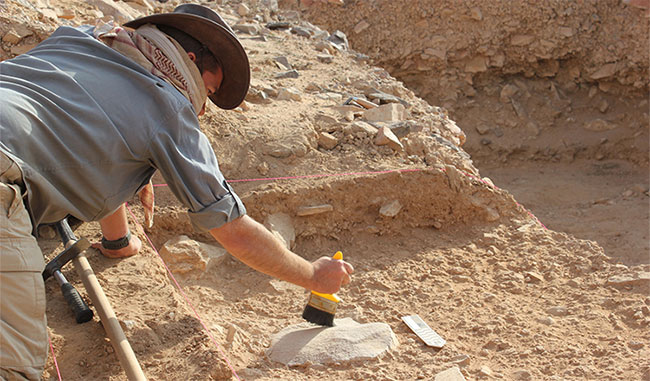Like an ancient extinct because ... lazy
Laziness is extremely disastrous for Homo Erectus, a distant relative of our modern humanity. They were wiped out after nearly 2 million years of existence.
Archaeologists from the Australian National University (ANU) have published a surprising study of an ancient human species, which has a history six times longer than our modern humans but has become extinct because of its lazy . Their life has just been exposed through precious relics in Saudi Arabia.

The relics of Homo Erectus are being excavated - (photo: ANU).
It is a human named Homo Erectus , belonging to the genus Human (Homo), the primates as our modern humans (Homo Sapiens). They appeared long before us - about 2 million years ago, living concentrated in areas that are easy to find rocks and water.
To survive in the Stone Age, the Homo Erectus picked up all the stones found around their camp. According to archaeologist Ceri Shipton of ANU, the evidence found at Saffaqah (Saudi Arabia), this ancient human being proved very strong and intelligent.
When we modern humans have not yet appeared on earth, they have used stone to create knives, spear heads and countless other intelligent tools. However, they have a flaw that is quite lazy. They just picked up the stones around the camp, the stones rolled down from the mountain.
Meanwhile, the later human species such as Neanderthals or modern Homo Sapiens are not afraid to climb, climb up the hill to find better quality stones, more suitable sizes to gradually raise the quality and level. variety of tools.
This smart but lazy person has lived well and thrived for nearly 2 million years. However, sediment traces show that about 50,000-100,000 years ago, the rivers where they lived were dried up. In-place rock sources do not guarantee enough tools for life.
"Not just lazy, they are very conservative," said Shipton archaeologist. Their tools keep the size and texture even though the environment changes a lot. The consequence of such laziness and conservatism is that they have been wiped out from human history.
Meanwhile, with the constant change in the way of finding sources of life, manipulating tools, the young Homo Sapiens - whose oldest bones and teeth were found to be dated to just over 300,000 years - were released. growing and becoming the only species of Chi genus that exists today.
The research has just been published in the scientific journal PLOS One.
- Lazy animals are less likely to become extinct
- The mystery of laziness
- 4 arguments for lazy people have been proved by science
- List of the most lazy countries in the world, Vietnam where?
- The sloths but diligent
- Why are people lazy to exercise?
- People are inherently lazy
- Science proves to use many smartphones to make lazy brain work
- Lazy King - Lazy to grow moss
- Discover common ancestors of modern people and extinct people
- Discovering the 'love path' where 5 species of humans mate in deformities
- Impressive inventions for lazy people
 Discovered an ancient centipede fossil 99 million years old
Discovered an ancient centipede fossil 99 million years old Discovered bat-like dinosaurs in China
Discovered bat-like dinosaurs in China Discovered a 200-year-old bronze cannon of the coast
Discovered a 200-year-old bronze cannon of the coast Discover 305 million-year-old spider fossils
Discover 305 million-year-old spider fossils